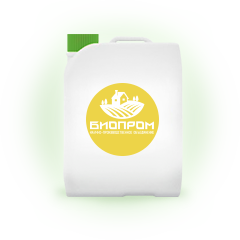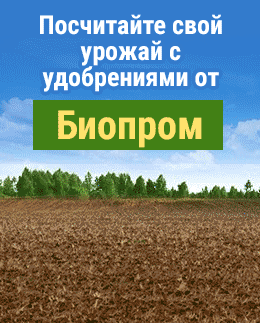Bacterial fertilizer Bactophosphine

Bactophosphine is an eco-friendly phosphorous bacterial fertilizer that is based on Bacillus mucilaginosus bacteria. The product is used for improving the soil fertility in preparation for planting grain, technical, vegetable, forest and decorative crops. Phosphate biofertilizers are more effective when applied to the soil in autumn and spring or used in pre-sowing seed treatment, planting seedlings and fertilizing vegetative plants.
In order to properly apply the microbiological fertilizer Bactophosphine into the ground, please read the instructions carefully. The Scientific and Production Association “Bioprom” offers to purchase the product both wholesale and retail.
How to use Bactophosphine?
Bactophosphine interacts with insoluble phosphorous compounds that cannot be absorbed by plants themselves and transforms them into soluble forms which are well assimilated by plants. Thanks to this, rich in phosphorus soils do not need extra mineral phosphorous fertilizers (their consumption may be reduced by 1,5-2 times) and that makes the soil compounds of potassium accessible for plants.
Bactophosphine reduces the level of crop nitrates by 3-5 times, increases yields by at least 15%, improves the condition of soil by destroying soil pollutants after long use of chemicals and improves the biological activity of soil. Only 1 g of the liquid form of the product contains at least 0,12 billion viable spores and 1 g of the dry form – at least 50 billion spores.
Results of the use of Bactophosphine
The bio product is effective during the whole plant growing season both on the open land and in greenhouses. Bactophosphine restores the fertility and the structure of soil, increases the resistance of plants to fungal diseases, accelerates the soil-forming process during the recultivation of land. The consumption value varies from 0,2 to 0,4 kg/ha depending on climate, soil condition and type of crops.
The use of this product provided a significant increase in the yield: barley – 18% (5 c/ha), corn for silage – 22,3% (99,5 c/ha), spring wheat – 53% (12,7 c/ha), buckwheat 24% (4 c/ha). Also the rooting capacity of stems has increased: cherry – by 14%, mock orange – by 40%, raspberry – 28%.
| Crop | Dosage | Application features |
|---|---|---|
| All crop types |
0,2 l/ha Solution consumption 400-1000 l/ha |
In spring before ploughing, during or after |
| Grain crops |
0,7-1 l/ton Solution consumption 10 l/t |
Pre-sowing seed treatment |
| Corn, sunflower |
5 l/ton Solution consumption 10 l/ha |
|
| Potato |
0,1 l/ton Solution consumption 10 l/ha |
|
|
Perennial herbs (pulses and cereals) |
0,2-0,25 l/10 kg Solution consumption 10 l/10 kg |
|
| Vegetables |
0,1-0,3 l/kg Solution consumption 1 l/kg |
|
| Vegetable, decorative, fruit and berry crops |
0,4 l/ha Solution consumption 5000-10000 l/ha |
Watering during sowing |
| All cultures |
0,2 l/ha Solution consumption 10000 l/ha |
Root fertilizing |
| 0,2-0,4 l/ton of soil | Preparation of soil fertilizer mixtures | |
|
1,0-2,5 l/ha Solution consumption 1000 l/ha |
During recultivation of soil |
The guaranteed storage time in the cover is 12 months from the date of manufacture. Biofertilizers should be kept separately from toxic chemicals. The product’s natural form is gel (liquid) and dry. You can also purchase a complex of biofertilizers Ecophyte + Bactophosphine.
